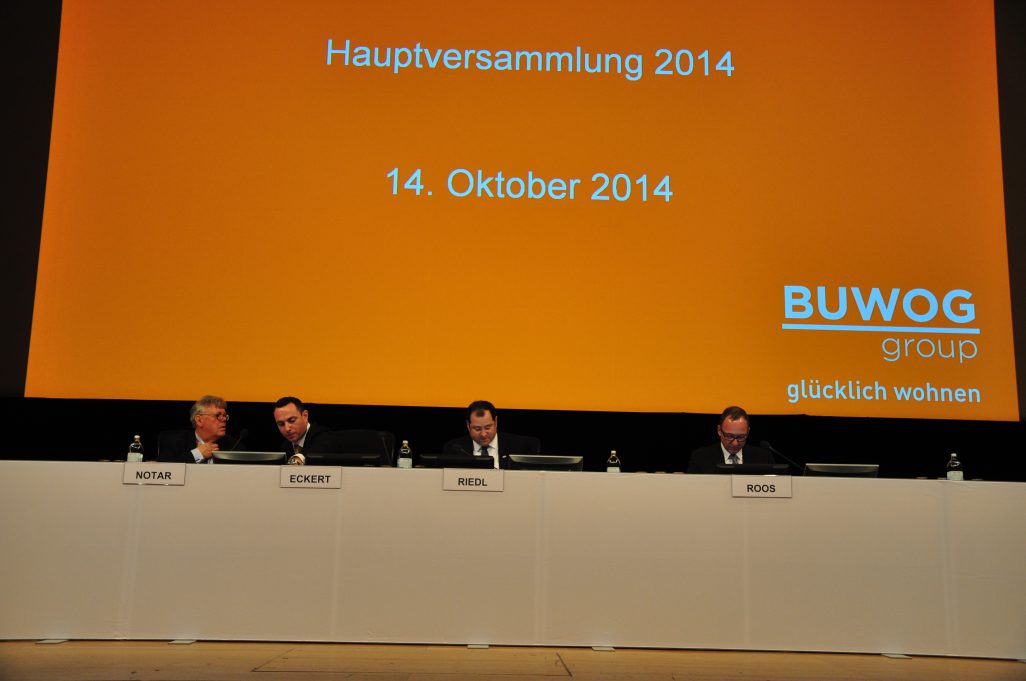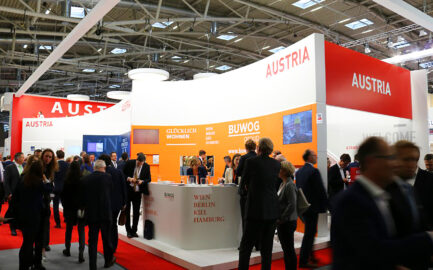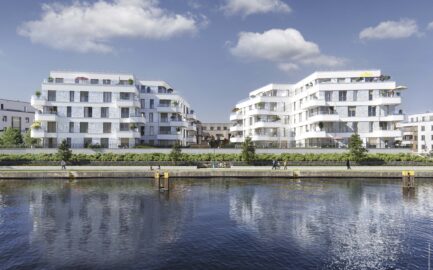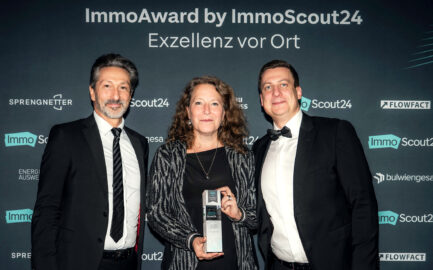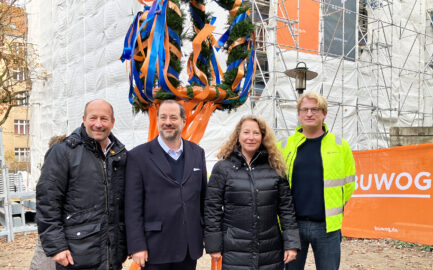The 1st ordinary shareholders’ meeting of BUWOG Group begins, Supervisory Board Chairman Vitus Eckert gives a warm welcome to all shareholders and representatives as well as the supervisory board. Dr Schumy, who will introduce himself later as a candidate for the supervisory board (in place of Dr Zehetner), is welcomed just as warmly by Eckert as the members of the executive board, auditors and notary Dr Bieber.
Eckert reminds everyone to switch off their mobile telephones and apologises for the security measures, which, however, are necessary. The buffet will be opened at approx. 12:30, Eckert announces.
Eckert explains how the comment session works (reading in person or by the Supervisory Board Chairman).
The agenda of the shareholders’ meeting was distributed to all shareholders in printed form in the folder in the entryway. Questions and requests can only be made concerning these items.
We come to the 1st item on the agenda:
The presentation of the annual and consolidated financial statements, the corporate governance report, the proposal for the appropriation of the balance sheet profit, and the report of the supervisory board.
CEO Daniel Riedl begins his presentation. It starts with a gallery of photos of highlights from the 2013/14 financial year. These include the partial sale of the portfolio in Upper Austria to WAG, signings which expanded the portfolio in Germany, for instance 1,194 residential units in Kassel (signed in August 2013), 884 units in Lüneburg, Syke (September 2013), 587 units in Kiel (signing October 2013), and the signing of the Apollo portfolio with 1,206 units in Berlin and environs (November 2013). The big highlight, of course, was then the signing of the DGAG portfolio in February 2014 with around 18,000 units in Northwest Germany.
The extraordinary shareholders’ meeting of IMMOFINANZ AG in March 2014, at which the shareholders approved the spin-off of BUWOG, is logically mentioned as a highlight. Two pages of photographs are dedicated to the stock exchange listings in Frankfurt, Vienna and Warsaw. Daniel Riedl is pleased to recall ringing the stock exchange bell in Frankfurt. At the end of the series of photos highlights from the first quarter of 2014/15 are presented such as the sale of the commercial property management business in Austria (BUWOG FM) and, of course, the closing of the DGAG portfolio acquisition.
In his presentation Daniel Riedl then goes into BUWOG Group’s three-pillar business model: asset management, property sales and property development. All three business areas are incorporated into the real estate industry’s main indicator, recurring FFO, which was € 69.2 million in the 2013/14 financial year and € 21.9 million in Q1 of 2014/15.
Regarding property development Daniel Riedl mentions again that BUWOG Group is developing only in Vienna and Berlin.
BUWOG Group’s attractive portfolio is then presented. As of Q1 2014/15 the portfolio has a total of 52,546 existing units. In Germany since the acquisition of the DGAG portfolio the focus has been on the Northwest region and Berlin.
Daniel Riedl hands the floor over to his colleague on executive board, Ronald Roos (CFO), who will give all shareholders a clear presentation of the key figures of the financial year.
“We can look back at a very successful financial year in 2013/14 and promising 1st quarter of 2014/15”, Roos says, beginning his talk.
In addition to recurring FFO (see above), total FFO of € 81.8 million in the overall year of 2013/14, an operating result of € 97.3 million, EPRA NAV per share of € 17.21, and loan to value (LTV) of 35.9%.
“The lower the LTV, the more conservative a company is financed, the higher the equity share”, Roos explains to the interested audience.
Today the phrase “attractive dividend” is mentioned for the first time.
At the shareholders’ meeting there is an option for every shareholder to get a copy of the BUWOG annual report. The supply has very been well-received so far; in the audience you can see a large number of shareholders holding the annual report and studying it parallel to Ronald Roos’ presentation.
Things continue with BUWOG Group’s consolidated financial statements featuring the group’s income statement and balance sheet.
The presentation on the shareholders’ meeting can already be downloaded here (in German): http://www.buwog.com/fm16187/BUWOG_HV_14Okt2014_FINAL.pdf
Mr Roos calls attention to the special feature of the Q1 consolidated financial statement, as the DGAG and Apollo portfolio is included here for the first time.
Mr Roos goes into the multilevel structure of FFO, starting with the consolidated result – all income statement effects that do not effect cash flow are reversed in FFO. The second feature: results from property sales are excluded from the calculation in the first step and only the revenues from the sale of individual flats are added back in here. That means: the revenues, the inflow of funds from the portfolio and property sales are not found in the recurring FFO.
Recurring FFO in Q1 2014/15: € 21.9 million.
“We’re very conservatively financed”, says Roos.
LTV of 49.1%
“The figures will change in the next few weeks. We have taken out a loan of approx. € 400 million (for DGAG). This loan currently has no interest rate hedge; we will handle this, which will result in a slight increase in the interest rate”, says Roos.
Roos also goes into the refinancing of the convertible bond held by IMMOFINANZ AG.
The refinancing is to be carried out by means of mortgage bonds – the advantage: long maturity (over 20 years), interest rate of approx. 2.5%.
As a result the LTV will rise slightly, longer-term financing costs more money.
The refinancing is cheaper than the convertible bond, though.
Ronald Roos now turns the floor back over to Daniel Riedl, who presents the structure of the existing portfolio.
Vacancy rate in Austria 5.1%. “In our Austria business we need somewhat of a vacancy rate in order to sell flats at a profit as freehold flats”, Riedl explains.
In Germany the acquisitions led to an increase in the vacancy rate, of course.
Now the subject is the DGAG portfolio and takeover of the management platform. Approx. 300 employees in Germany were integrated into BUWOG Group. The next step: incorporating 8400 existing German BUWOG units into the management platform.
The administrative centres in Kiel, Hamburg, Lübeck, Braunschweig and the major BUWOG location in Berlin are introduced.
Next item: property sales. This business segment is divided into single-unit flat sales and block sales. The former contributes to recurring FFO, as it involves recurring revenues through the sale of single units. Block sales take place when there are favourable opportunities and good margins, but are not factored into recurring FFO.
Next topic: property development.
Daniel Riedl points again to the exclusive activities in Vienna and Berlin, indicating that according to the bulwiengesa study BUWOG is the leading developer in the privately financed segment in Vienna and now among the top developers in Berlin.
Wohnquartier 22 (Wulzendorferstr., Vienna), Danubio (Jedlseer Str., Vienna) and Chausseestr. in Berlin are shown as reference projects. Riedl is especially proud of the “Gervin & Wilmers” project in Berlin, which is currently in the construction phase. 60% of the flats have already been sold; completion is planned for August 2015.
The meeting now continues with the subject of “capital market positioning”. Daniel Riedl: “The recommendation of the majority of analysts is ‘buy'”. The closing share price yesterday (13.10.2014) was € 15.21.
“As CEO I’m proud of what we’ve accomplished and I’m convinced that we were only able to do this together”, says Riedl, praising BUWOG Group’s many committed employees, who enabled the good results before and after the stock exchange listing.
Before the end of his talk Riedl mentions further plans and of course the planned divided of 69 cents and stable dividend policy of 60%-65% of recurring FFO in the medium term.
Now Vitus Eckert takes the floor and opens the discussion, the first speaker is Dr Wilhelm Rasinger of the Austrian Association of Investors (IVA).
Rasinger: “It is most welcome to get a report of a success story here. I think the figures substantiate this impressively. The expectations prior to the spin-off have been met and even more welcome is that things are still on the up. Anyone who doesn’t have BUWOG shares today has only himself to blame”.
Rasinger’s first question: “How high were the non-recurring costs of the stock exchange listing and what ongoing costs can you expect as a result of restructuring the organisation without the extensive IMMOFINANZ ‘services'”?
The costs for the research consultancies are also addressed. Rasinger also wants to know whether the dividend is a “welcome bonus” or whether shareholders can expect a similarly attractive divided for the long term. In his remarks at the podium Rasinger also goes into the differences between Germany and Austria and their effects on EPRA NAV. Austria’s complicated tenancy law also bothers him. “How many proceedings are pending with out of court and in court and what are the issues”, Rasinger asks. He also recalls the “lift cartel” in Austria and wants to know whether compensation for damages from these proceedings will go to BUWOG and how the compensation will ultimately be divided.
Rasinger is also interested in the focuses of internal revision at BUWOG.
“How high is the carrying value and sales revenues of BUWOG FM”, Rasinger asks in his final question.
Rasinger praises BUWOG’s financing, which differs from other real estate companies. Rasinger sees the BUWOG shares acquired by Daniel Riedl as a very positive signal on the market.
Responses from Daniel Riedl. To begin with, he says: “I currently hold approx. 74,000 BUWOG shares together with my wife. I believe in what I’m doing”.
Roos’ response: “Analyses of BUWOG AG – we don’t pay for a single one of these analyses. Dividends: We aim for dividend continuity; we plan to pay 60%-65% of recurring FFO; until we’re in this target range the plan is dividend continuity, thus 69 cents / share.
Costs arising from property valuations: € 500,000 in the last financial year, but we have now renegotiated € 460,000 with CBRE for a considerably higher-value portfolio”.
Costs of the stock exchange listing: “IMMOFINANZ assumed the costs by agreement, we had an investment bank as a consultant, the costs were approx. € 200,000 – € 250,000. Prior to the spin-off , of course, we didn’t have an IR division or big marketing division. On average the ongoing additional costs arising from the stock exchange listing are in the low one-digit million range”, according to Roos.
Riedl on the lift cartel: “We’ve initiated proceedings against four lift companies; this is still ongoing in the court of first instance. The amount in dispute is approx. € 4.4 million + interest. The proceedings are dragging on, but we’re quite proud that we’ve been able to reduce the ongoing costs by having gone public with the issue. Now we’re paying less for lift maintenance, etc. – BUWOG was the first to bring this issue to public attention. The costs, to the extent they were to be calculated with the maintenance costs, will benefit tenants depending on the statute of limitations. Construction costs will flow into the company”.
Riedl on the out-of-court proceedings (approx. 20 – this is only in Austria) and court proceedings (approx. 500 in Austria, 500 in Germany).
Difference in the return on investment between Austria – Germany: the essential difference comes from market conditions. In Austria this is not institutionally defined; there aren’t investors from all over the world here; it’s much more in the hands of regional authorities, non-profit foundations, etc. There is less happening on the market, but demand is significant. This results in the return. We continually manage to sell entire properties at fair market value; that’s important to me.
Riedl on Internal Audit and Compliance: “Mr Töpfer is sitting here, thus Internal Audit and Compliance is also observing the shareholders’ meeting”. He introduces Mr Töpfer and Ms Himsel. “The focus of the audits tended to be processes – the acquisition process, the sales process; these were the key aspects. Mr Töpfer coordinates with the auditors and IT. I have the feeling our auditing system reflects what the market shows”.
On the BUWOG FM sale: “We actually agreed to remain confidential concerning the sale of the third-party management business, but in the quarterly report you’ll find something about it – as a small hint”. The commercial management business simply did not fit BUWOG any longer.
A shareholder’s question: How does rent control in Germany effect BUWOG’s business?
Riedl: “It probably affects us in parts of Berlin where we have rents that are to some extent considerably above the rental index. It hasn’t taken hold yet, however. The government in Germany has approved it and now it’s heading to the Bundestag, but as yet it’s unforeseeable as to what regions in Germany it will benefit. And there are already institutions now that doubt whether rent control is in conformity with the constitution”.
A shareholder’s question: Is BUWOG planning to build short-term flats?
Riedl: “So far it hasn’t appeared reasonable to us because it entails quite a lot of additional costs and is generally a niche. Also because there is no opportunity for land acquisition. I wouldn’t rule it out, but it’s certainly not the heart of BUWOG’s strategy”.
A shareholder’s question: How long will freehold flats in Vienna be looked after by BUWOG?
Riedl: “There isn’t a precise timeline. As long as we have most of them in mixed-use buildings, we can turn over more, but of course we know our ‘colleagues’ are the buyers of our freehold flats. But that’s really a situation that has to be considered on an individual basis”.
A shareholder’s question: How is BUWOG still connected to IMMOFINANZ?
Roos: “There are still areas and residual connections in the area of consolidation. Remuneration takes place on an hourly basis in accordance with market prices. There are also certain liability commitments still, as is detailed in the annual report and quarterly financial statements. We’re working to dissolve these links as soon as possible. The third issue concerning the connection is of course the convertible bond, which we will redeem soon”.
A shareholder criticises English terms such as “like-for-like rental growth”. He would like to hear German terms first. Vitus Eckert responds: “We operate in an international business and the capital market is driven by international players whose language is English”.
A shareholder has tax-related questions concerning the dividend payout in Poland, for instance whether it, too, is tax-exempt. This is an issue for a personal tax consultant; unfortunately this cannot be answered at the podium.
A shareholder asks who Internal Audit and Compliance is subordinated to and to whom it reports.
Riedl answers that Internal Audit and Compliance is subordinated to him, but of course reports regularly to the supervisory board, for instance right after the shareholders’ meeting.
“The sustainability of the Germany portfolio” interests the next shareholder. He would also like to know more about BUWOG Group’s plans for growth in the next few years.
Daniel Reidl explains that the portfolios in Austria and Germany are designed very similarly, except for that in Germany building management costs cannot be charged in the scope of maintenance costs. Concerning growth the audience learns that there are plans to expand yearly with investments in new properties; the focus is approx. 4000 units per year in Germany.
A BUWOG Group shareholder asks: How high are the costs for listings on the stock exchanges in Frankfurt and Poland? How many shareholders come from the USA and Great Britain? What revenues were obtained from the sale of the Upper Austrian flats? And how many flats are there still in Upper Austria?
Ronald Roos announces that approx. € 60,000 in listing and market costs is incurred for all three markets per year. After that Riedl explains that due to costs there is currently no shareholder ID at BUWOG. About 1100 flats were sold in Upper Austria, about 600 are still in the portfolio. There is a non-disclosure agreement concerning the revenues.
It is now shortly before 14:00 and most of the listeners who briefly left the room at noon are back again.
Vitus Eckert comes to agenda item 2, as there are no further comments on item 1.
Item 2:
Resolution on the appropriation of the balance sheet profit stated in the annual financial statements for 2013/2014.
The executive board and supervisory board of BUWOG AG propose the following resolution:
Out of the distributable balance sheet profit in the amount of € 78,780,189.79 reported in the annual financial statements of BUWOG AG on 30.04.2014 a dividend of € 0.69 per share bearing dividend entitlement will be distributed to the shareholders for the total number of 99,613,479 company shares entitled to receive a dividend, hence € 68,733,300.51 will be distributed to the shareholders and the remaining balance sheet profit of € 10,046,889.28 will be carried forward to new account. The distribution of the balance sheet profit shall be qualified under Austrian tax law as repayment of capital in accordance with Section 4 Subsection 12 of the Austrian Income Tax Act. The dividend is due on 23 October 2014 (dividend payment date). The shares of BUWOG AG are traded on the Frankfurt Stock Exchange, the Vienna Stock Exchange and the Warsaw Stock Exchange from 15 October 2014 ex dividend for the 2013/2014 financial year (dividend ex-date).
It comes immediately to the first vote. The shareholders’ meeting therefore has a quorum.
Mr Eckert explains the voting procedure.
The first request for resolution has been approved by the shareholders’ meeting.
It continues with agenda item 3:
Approval of the actions of the members of the executive board
The executive board and the supervisory board of BUWOG AG propose to grant approval of the actions of the members of the executive board for the 2013/14 financial year.
There are no comments on this proposal.
The proposal for resolution obtained the required majority and was approved by the shareholders’ meeting
It continues with agenda item 4:
The executive board and the supervisory board of BUWOG AG propose to grant approval of the actions of the members of the supervisory board for the 2013/2014 financial year.
There are no comments. There is a vote on each individual supervisory board member.
The proposals for resolution are approved; all supervisory board members are granted approval for their actions.
Agenda item 5 follows:
Election of the auditor for the financial statements and the consolidated financial statements.
The supervisory board of BUWOG AG, following a recommendation of its audit committee, proposes to appoint Deloitte Audit Wirtschaftsprüfungs GmbH as auditor for the financial statements and consolidated financial statements for the 2014/2015 financial year.
There are no comments, the voting begins.
The request for resolution has been approved. Deloitte Audit Wirtschaftsprüfungs GmbH is elected auditor of the financial statements and consolidated financial statements for the 2014/2015 FY.
It comes to the 6th item on the agenda:
Resolutions on the conditional increase in share capital (Section 159 Subsection 2 Item 3 of the Austrian Stock Corporation Act) for the purpose of granting stock options to the members of the executive board (long-term incentive programme 2014) and the related amendments of the Articles of Association in Article 4 (Registered Capital and Shares).
There are separate slides presented by Vitus Eckert on this item (in German). The slides are available for download on pages 40/41 at http://www.buwog.com/fm16187/BUWOG_HV_14Okt2014_FINAL.pdf.
There is a comment on this item: the shareholder asks if he’s right that the hurdle for the long-term incentive programme has already been surpassed. Eckert says he is right; the hurdle for the first year has already been surpassed as a result of the welcome share price performance for the long-term incentive programme. When the programme was developed, however, this was still unclear and the company was reluctant to call an extraordinary shareholders’ meeting for this purpose; it would probably have cost more than the sum under discussion.
Another shareholder calls attention to the performance of the remaining employees. Eckert points out that he hopes to motivate the BUWOG employees of the second and third management levels and to adequately reward them in financial terms, but that this programme was simply tailored by the supervisory board to the executive board.
Another shareholder proposes a “fair bonus system”, saying that this form of stock option programme has been abandoned in Europe. Eckert says that there is a bonus system in BUWOG as well. In general, the entire issue is a question of philosophy, but Eckert does not agree that promoting sustainability or learning from experiences from the financial crisis has been abandoned. Eckert says that the executive board has to earn every single share, that this doesn’t cost shareholders a cent and that the system is highly valuable in view of sustainable corporate development.
Since there are no further questions there is a vote.
The proposal for resolution has been approved.
It continues with agenda item 7:
Resolution on the cancellation of existing but unused conditional capital (Section 159 Subsection 2 Item 2 of the Austrian Stock Corporation Act) pursuant to the resolution of the shareholders’ meeting of 14.03.2014 for the purpose of implementing the spin-off and takeover agreement with IMMOFINANZ AG.
Mr Eckert reads the proposal for resolution by the executive board and supervisory board. There is a vote.
The proposal for resolution has been approved.
It continues with agenda item 8:
Resolutions on the authorisation of the executive board to issue convertible bonds together with the authorisation of the executive board to exclude the shareholders’ subscription right on convertible bonds as well as resolution on the conditional increase of the share capital
Daniel Reidl now reads out the reasons for this item on the agenda and the proposal for resolution from the executive board and supervisory board.
There are several comments on this as well.
In the following vote the proposal for resolution was approved again by the shareholders’ meeting.
We’ve now reached the final item on the agenda.
Point 9 concerns a by-election to the supervisory board.
The supervisory board currently consists of five members elected by the shareholders’ meeting. The term of office of supervisory board member Dr Eduard Zehetner expires at the end of the ordinary shareholders’ meeting resolving the approval of the actions for the 2018/2019 financial year.
In connection with Dr Eduard Zehetner ending his mandate as member of the executive board of IMMOFINANZ AG, Dr Eduard Zehetner will have effectively retired from the supervisory board of BUWOG AG, effective by the end of 30 April 2015. Dr Oliver Schumy has been appointed as new member of the executive board of IMMOFINANZ AG.
The supervisory board proposes to elect Dr Oliver Schumy to the supervisory board. Vitus Eckert now asks Dr Schumy to introduce himself to the shareholders’ meeting.
Dr Schumy: “BUWOG is a very good company with great potential”. Dr Schumy gives a brief summary of his curriculum vitae. He already gathered experience in the real estate industry in early years and learned the business from bottom up in Munich in his father’s company.
As of April 2015 Schumy will be employed for IMMOFINANZ. His presentation is very brief. He extends his thanks for the attention and receives applause from the audience.
A shareholder takes the opportunity to highlight the actual work of Dr Schumy at Mayr Melnhof and to thank Dr Zehetner for his work at IMMOFINANZ.
There are no further comments, there is a vote.
The shareholders’ meeting approves the election of Dr Oliver Schumy to the supervisory board.
Vitus Eckert also takes the opportunity to thank Dr Eduard Zehetner. “Without your commitment none of us would be sitting here today”, Eckert tells Zehetner.
At the conclusion of the shareholders’ meeting Daniel Riedl also thanks his employees in the back office, the podium applauds the employees behind the stage.
Vitus Eckert concludes the shareholders’ meeting at 15:38.
We, too, were very pleased to be able to blog for you and hope you have a wonderful rest of the day. It’s highly gratifying that all of the proposals for resolution were approved, that many shareholders were in attendance, that the share price performance, business model, and work of the BUWOG employees met with praise and that the annual report enjoyed great demand and was mentioned several times by shareholders in positive terms.
Sincerely,
Your communication team Ingrid Fitzek & Michael Lippitsch

